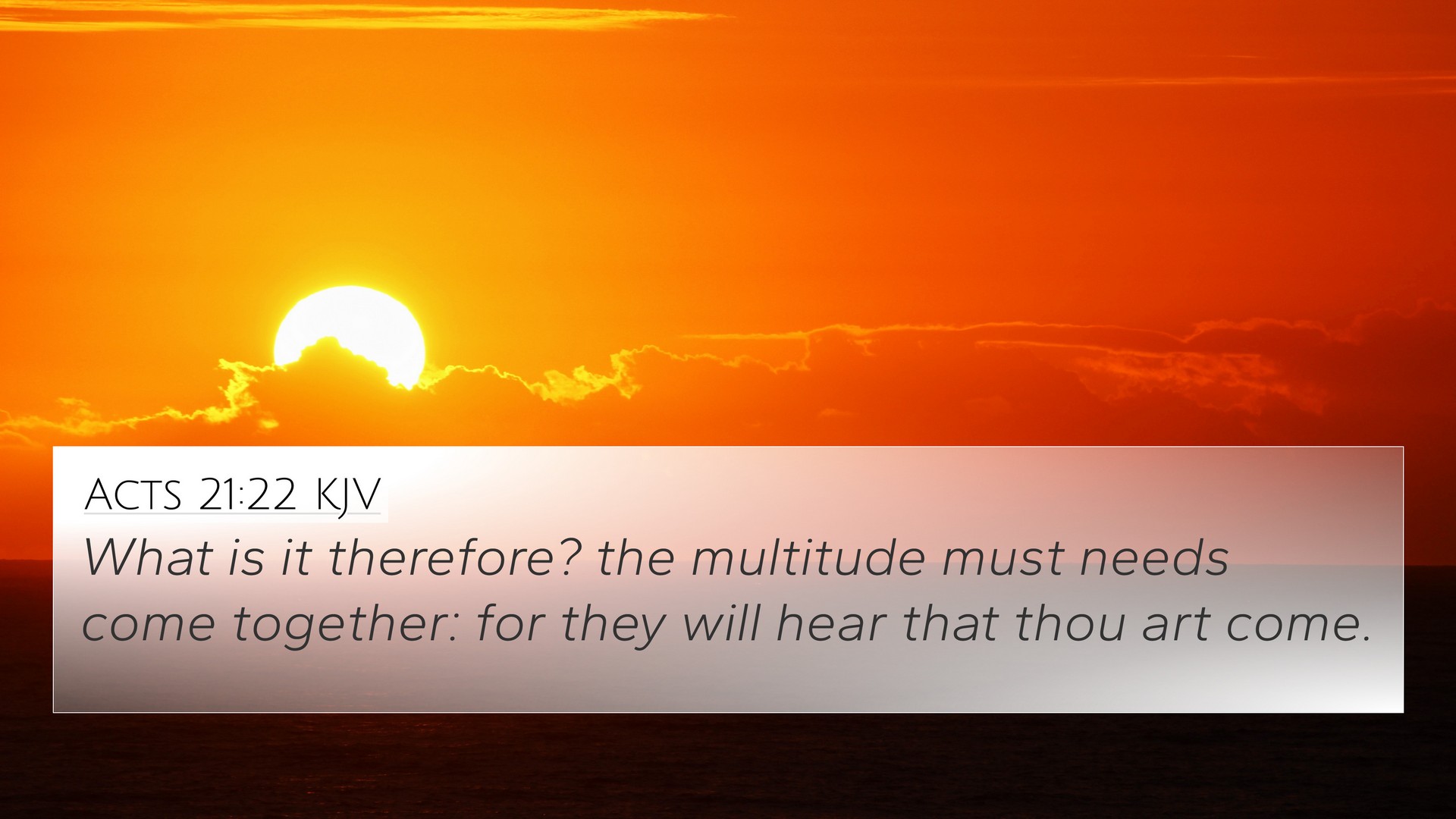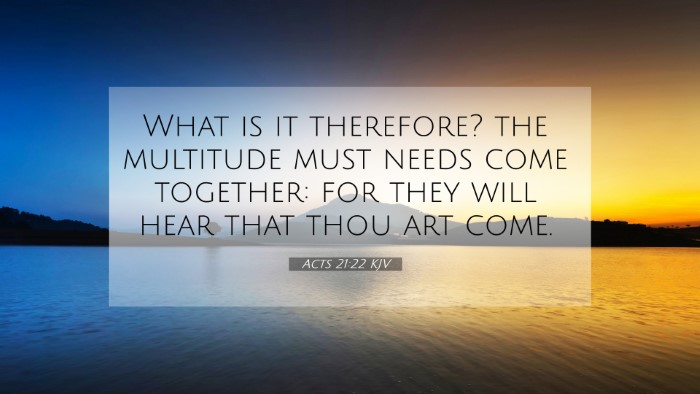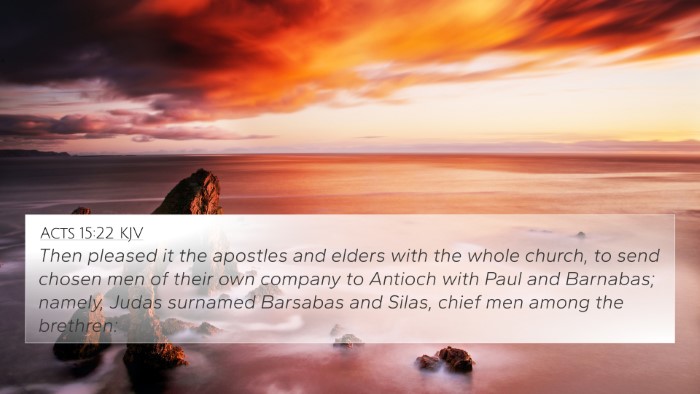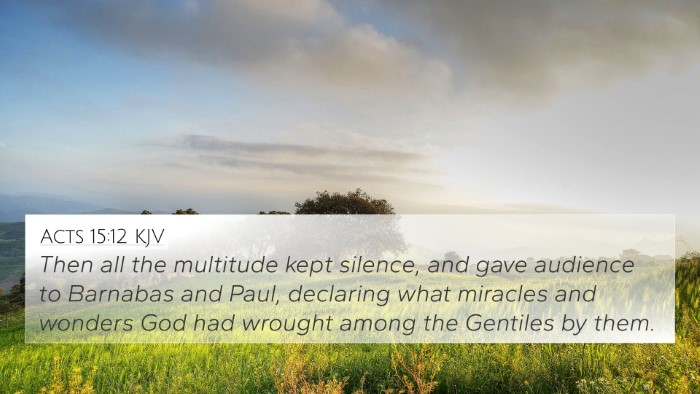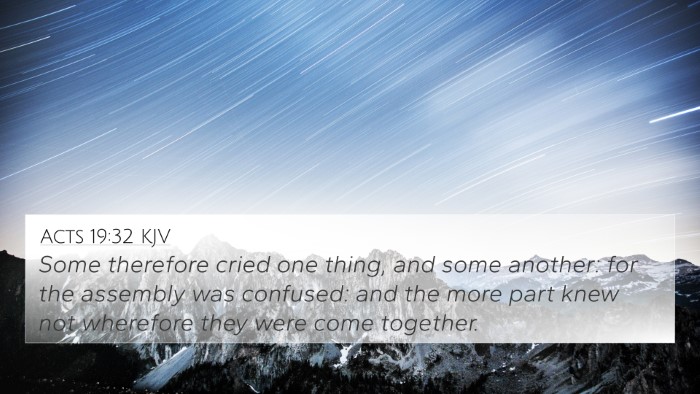Understanding Acts 21:22
Acts 21:22 is a key verse within the New Testament that reveals the tension between Jewish traditions and the emerging Christian faith. The verse states, “What then is to be done? They will certainly hear that you have come.” This implies a call to address the expectations and perceptions of the Jewish believers in Jerusalem regarding Paul’s ministry among the Gentiles.
Summary of Acts 21:22
In this context, the Apostle Paul returns to Jerusalem, and the leadership of the church there is concerned about his teaching, which appears to undermine the law of Moses as followed by the Jewish community. The commentaries of Matthew Henry, Albert Barnes, and Adam Clarke give us rich insights regarding the implications and the urgency expressed in this verse.
Matthew Henry's Commentary Insights
Matthew Henry emphasizes the concern of the Jerusalem church over Paul's actions and the fear that his presence could exacerbate tensions. His commentary outlines that Paul, as a fervent preacher of the Gospel, faces misunderstanding and animosity from those who perceive his ministry as a threat to Jewish customs.
Albert Barnes' Exegesis
Albert Barnes discusses the strategic approach Paul must take to mitigate the concerns of the Jewish Christians. He notes that the leaders suggest a plan to adhere to certain Jewish practices as a gesture to show solidarity with the law. Barnes highlights that this situation reveals the transformative intersection of Jewish and Christian identities.
Adam Clarke's Perspective
Adam Clarke provides additional depth by exploring the socio-political ramifications of Paul's actions. He reflects on the significance of Paul’s mission to the Gentiles and the universal implications of the Gospel. Clarke points out that healthy dialogue between differing interpretations of faith is critically important.
Bible Verse Cross-References
Acts 21:22 connects profoundly with other Scripture, illuminating thematic ties and doctrinal connections. Here are key Bible verses that relate to Acts 21:22:
- Acts 15:19-20: Discussion about exemptions for Gentile believers from parts of the Mosaic law.
- Galatians 2:11-14: Paul confronts Peter regarding his behavior towards the Gentiles.
- Romans 10:12: Affirmation that there is no distinction between Jew and Gentile in the Gospel.
- 1 Corinthians 9:20-22: Paul explains how he adapts his approach to different groups to win them.
- Acts 21:25: A reiteration of the decision from the Jerusalem Council regarding Gentile practices.
- Philippians 3:5-6: Paul’s history as a Pharisee and how he views his former adherence to the law.
- James 2:10: The problem of relying on the law for righteousness.
Thematic Connections in The Bible
The conflicts and discussions surrounding Acts 21:22 demonstrate crucial themes regarding law, grace, and the inclusivity of the Gospel. These connections can be further explored using various tools for cross-referencing biblical texts. The insights provided by the commentaries above move us to seek deeper understanding through scriptural cross-referencing.
Tools for Bible Cross-Referencing
Engaging with cross-references to understand the intricate layers of Scripture is essential for a comprehensive Bible study. Below are some effective tools and methods to aid this pursuit:
- Bible Concordance: A vital resource that lists words and their locations throughout the Bible.
- Bible Cross-Reference Guide: Annotated editions that indicate connections between verses.
- Comprehensive Bible Cross-Reference Materials: These materials aid in exploring thematic dialogues within Scripture.
- Cross-Reference Bible Study: A method where key themes and verses are studied in parallel for greater understanding.
Practical Application of Cross-References
For a fruitful study experience, consider these steps when exploring scriptural cross-referencing:
- Identifying Connections: Seek relationships between Old and New Testament scriptures to grasp the continuity of God's plan.
- Comparative Study of Pauline Epistles: Analyze Paul's letters for recurring themes regarding the law and grace.
- Interpreting Biblical Themes: Utilize cross-references to highlight recurrent motifs across different books.
Conclusion: The Importance of Cross-Referencing in Biblical Study
Acts 21:22 serves as an important verse that not only calls attention to the challenges Paul faced but also opens avenues for broader discussion regarding the relationship between tradition and the transformative power of the Gospel. By leveraging tools for cross-referencing and understanding the connections between Bible verses, believers can cultivate a more profound grasp of Biblical truths and their applicability in today’s context.
